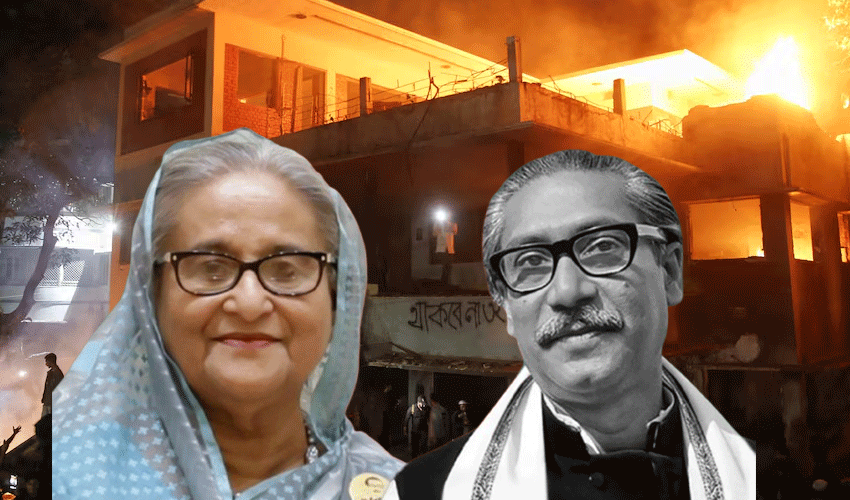Climax of Political Unrest
Political unrest in Bangladesh reached its peak on Thursday as protesters, some armed with sticks and tools, stormed the residence of Sheikh Mujibur Rahman, the father of ousted prime minister Sheikh Hasina. The building, a historically significant site where Bangladesh’s independence was declared in 1971, was set ablaze and partially demolished with a crane and excavator.
The protest was part of the “Bulldozer Procession” aimed at disrupting Hasina’s scheduled address to the nation via social media.
Hasina’s Speech and Response
Hasina, in exile in India since her ousting in August 2024, delivered a fiery speech, calling on her supporters to stand against the interim government and accusing them of seizing power unconstitutionally.
The protesters, many part of the “Students Against Discrimination” movement, expressed strong opposition to Hasina’s government and called for the dismantling of the 1972 Constitution, which they see as a legacy of her rule.
Historical Significance
Sheikh Mujibur Rahman, known as Bangabandhu, is regarded as the architect of Bangladesh’s independence. His house, a symbol of the country’s liberation, also marks a tragic chapter in the nation’s history. In 1975, Mujib and most of his family were assassinated within its walls, and Hasina, who survived the attack, later transformed it into a museum dedicated to her father’s legacy.
In her speech, Hasina condemned the destruction of the house, stating, “They can demolish a building, but not the history. History takes its revenge.” Her comments reflect her defiance as she faces charges over her government’s crackdown on student protests, which led to hundreds of casualties.
Political Crisis and Calls for Justice
The unrest has been growing since August 2024 when mass protests forced Hasina to flee to India. The interim government, led by Muhammad Yunus, has struggled to regain control amid ongoing protests against Hasina’s party, the Awami League.
Protesters have called for Hasina’s prosecution for her role in suppressing student protests and for alleged corruption during her two decades in power.
Upcoming Elections and Government’s Future
Yunus, who assumed leadership after Hasina’s ouster, has committed to holding elections in late 2025 or early 2026, but the country remains in a state of uncertainty. Hasina’s supporters and opponents alike have criticized Yunus for exacerbating the economic crisis, with Yunus accusing Hasina of faking the nation’s economic growth and laundering billions of dollars.
Conclusion
As protests continue, Bangladesh stands at a crossroads. The burning of Sheikh Mujibur Rahman’s home marks a turning point in the country’s political struggle, potentially ushering in a new era of governance or deepening the divide that has plagued the nation for decades.



